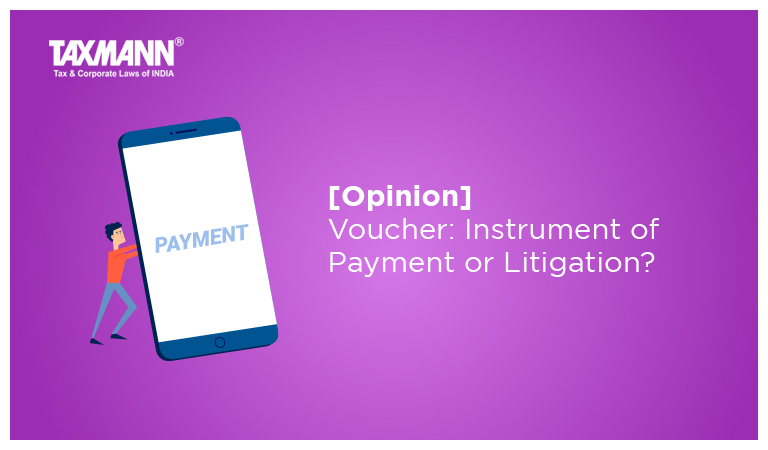[Opinion] Voucher: Instrument of Payment or Litigation?
- Blog|News|GST & Customs|
- 2 Min Read
- By Taxmann
- |
- Last Updated on 20 August, 2022

Shankar Rochlani & Pranav Mundra – [2022] 141 taxmann.com 283 (Article)
Voucher in modern times, are substituting the conventional and traditional methods of payment. Vouchers are redeemable instruments which can be used as a payment mechanism for the supply of goods or services. The industries have noticed the consumers attraction towards the vouchers, coupons, promo codes, etc. and use them as a catalyst to boost the sale. The trend of issuing vouchers has also significantly increased in the electronic commerce sector. The Electronic Commerce Operators (“ECO”) issue pre-paid vouchers or free vouchers in order to lure customers. These vouchers not only promote digitalization but also eases down the payment mechanism.
However, the taxability of voucher still remains a point of discussion all over the world. Therefore, in order to resolve such issue, the Indian Legislature while introducing the Goods and Services Tax Act, 2017 (“GST”) has kept this ongoing issue in mind and incorporated the same into newly enacted GST law.
This article is an attempt to explain the moot question that whether such incorporation in the GST Act, truly resolves the issue of taxability of Voucher and the aspects that require clarification to avoid litigation in future. Since Indian tax law with respect to Voucher is at nascent stage, therefore, it is important to discuss the provisions and taxability of Vouchers in European Union.
“Voucher” as per EU VAT Directives and Indian GST Legislation
The term voucher in oxford dictionary is defined as
“a printed piece of paper that can be used instead of money to pay for something, or that allows you to pay less than the usual price of something”.
It is on the same lines; the Voucher is defined under EU VAT directive.
Further, the definition of “Voucher” as per Section 2 (114) of the CGST Act is in verbatim adopted from the European VAT law directive by Article 30a (1) of European Union Council Directive 2016/1065 dated 1 July 2016.
The directive has also inserted the definitions of “Special Purpose Voucher (SPV)” and Multi- Purpose Voucher (“MPV”). The SPV is defined as a voucher where the place of supply of the goods or services to which the voucher relates are known at the time of issuance of voucher. For instance, mobile recharge coupons can be redeemed only against recharge and nothing else.
Whereas MPV2 is a voucher which can be redeemed for multiple purposes. For instance, voucher of Reliance Retail can be used for purchasing clothing, electronic appliances, stationary etc. Here, the actual supply of goods/ services, cannot be identified at the time of issuance of voucher. Hence, taxability is uncertain at this juncture.
The GST Council in its 5th meeting agreed to define the term “Voucher” and accordingly the definition of the term “Voucher” was incorporated in GST law. While GST law does not recognise the concept of SPV and MPV, but it is impliedly mentioned in the provisions of time of supply u/s 12(4) of CGST Act.
Click Here To Read The Full Article
Disclaimer: The content/information published on the website is only for general information of the user and shall not be construed as legal advice. While the Taxmann has exercised reasonable efforts to ensure the veracity of information/content published, Taxmann shall be under no liability in any manner whatsoever for incorrect information, if any.

Taxmann Publications has a dedicated in-house Research & Editorial Team. This team consists of a team of Chartered Accountants, Company Secretaries, and Lawyers. This team works under the guidance and supervision of editor-in-chief Mr Rakesh Bhargava.
The Research and Editorial Team is responsible for developing reliable and accurate content for the readers. The team follows the six-sigma approach to achieve the benchmark of zero error in its publications and research platforms. The team ensures that the following publication guidelines are thoroughly followed while developing the content:
- The statutory material is obtained only from the authorized and reliable sources
- All the latest developments in the judicial and legislative fields are covered
- Prepare the analytical write-ups on current, controversial, and important issues to help the readers to understand the concept and its implications
- Every content published by Taxmann is complete, accurate and lucid
- All evidence-based statements are supported with proper reference to Section, Circular No., Notification No. or citations
- The golden rules of grammar, style and consistency are thoroughly followed
- Font and size that’s easy to read and remain consistent across all imprint and digital publications are applied



 CA | CS | CMA
CA | CS | CMA
